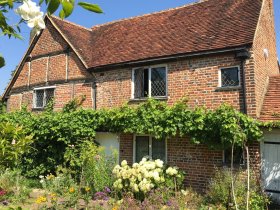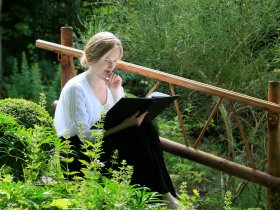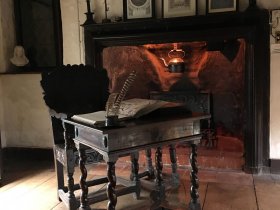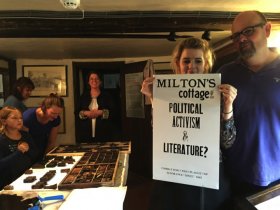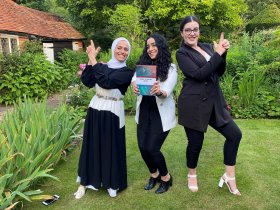Stay in touch with the latest news from AIM and get information on sector grants, jobs and events with our free fortnightly E-News.
Museum Profile – Milton’s Cottage
Milton’s Cottage: where paradise was lost and found
Open to the public since 1887, and based in the Buckinghamshire village of Chalfont St Giles, the Cottage is the place where Milton completed his epic masterpiece Paradise Lost and brought his fictional Satan into being (and with him the first fully realised anti-hero in Western literature).
Though other writers had conjured up minor demons, none had dared put the archfiend himself into print. To this day, the template for a devilish bad-boy who shakes up the world remains Milton’s Satan – the charismatic rebel who will not bow to any authority. Without him, there might be no Frankenstein, Moriarty, Mrs Coulter, or Voldemort.
Paradise Lost is an incredible creation – the work of an ageing, blind poet whose books were burned by order of Charles II and who narrowly escaped execution for his role in Britain’s only republican government. As Cromwell’s Secretary for Foreign Tongues, and unofficial spin doctor, Milton was one of the architects of our modern parliamentary democracy.
His interrogations of liberty – and the threats to it – make him the most modern of 17th century writers. At Milton’s Cottage, his only surviving home, visitors are surrounded by rare and first editions of his influential books and pamphlets, as well as an eclectic collection of paintings, prints and artefacts that bring his remarkable story to life.
We hold over 200 editions of Paradise Lost alone, with copies dating from 1667, in languages as diverse as Mandarin and Manx. This includes the lavish 4th edition of 1688, the first to be illustrated, which inspired artists from Blake to Turner, Gustav Dore to Salvador Dali, and made Paradise Lost the most illustrated poem in English literature.
You can view rare surviving editions of his political tracts, displayed alongside the Royal Proclamation of 1660 that ordered all copies to be burned. You can also enjoy our literary garden, planted with trees, flowers and fruits that are referenced in Milton’s poetry. It is the perfect reading environment, with books available to borrow and quotes planted throughout.
Milton’s Cottage receives no public funding, and our income comes from entrance fees, shop sales, fundraising events, individual donations and grants from trusts and foundations. In recent years, this has been supported by income from our endowment, set up in 2017 with match-funding from the National Lottery Heritage Fund’s Heritage Endowments scheme.
This proved a lifeline during Covid and, though we reached our match-funding target in 2019, we are continuing to build our endowment to help us engage audiences in new ways. Milton came here to escape an earlier pandemic, the Great Plague of 1665, and wrote the poem that transformed his life. We want to explore how Milton’s Cottage can have a similarly transformational effect on the lives of others.
Through our creative writing programme, we offer everyone the opportunity to write their own words where one of the world’s greatest poems was composed. And, reflecting Milton’s blindness when he lived here, we are working with residents with vision impairment to create a more multi-sensory visitor experience for people living with blindness today.
With support from AIM we developed an augmented reality app for younger audiences, transforming one of the world’s oldest writer’s house museums through new technology. Along with other creative interpretations, from manga to shared readings, this is helping us engage new audiences with Milton’s extraordinary legacy.
Nearly 350 years after his death, the impact of Milton’s writing can still be seen in our literature, politics, society and even the language we speak: he is credited with bringing 630 new words into English – more than anyone, including Shakespeare. From outer space to pandemonium, satanic to self-esteem, he has made our language and our society immeasurably richer.
Milton’s Cottage is the only museum in the world dedicated to his life, work, and times. At the heart of every visit is the opportunity to sit in Milton’s study, see where thoughts became words, and experience where literary history was made.
Kelly O’Reilly, Director

